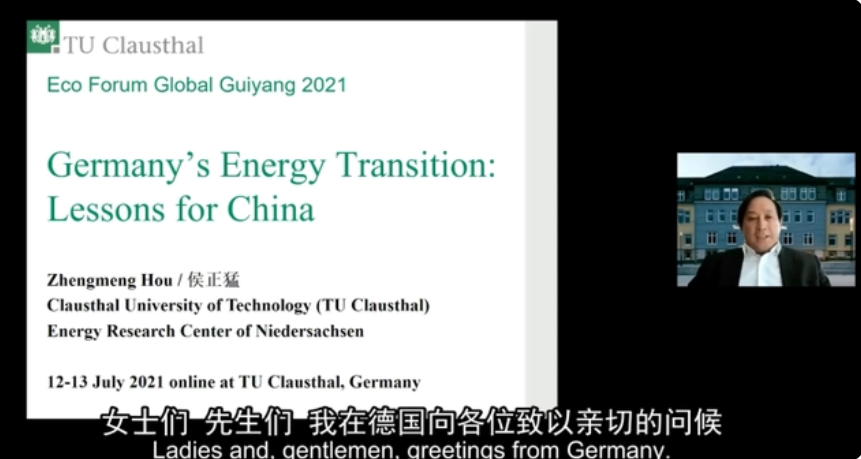Hou makes suggestions for carbon reduction in Yunnan
Hou Zhengmeng, a Chinese professor at the Clausthal University of Technology (CUT) in Germany, was born in Langzhong, Sichuan province. He studied mining engineering at central Yunnan’s Kunming University of Science and Technology (KUST) in 1979.
For many years, Hou has been based in Germany, engaging in teaching, scientific research and international cooperation. He focuses on oil/gas and geothermal development, comprehensive utilization of underground space, geotechnical engineering of rock-soil and environmental energy, and carbon neutrality and energy transformation.

Hou has an online lecture in 2021.
When it came to his unforgettable studying experience in Yunnan province, Hou Zhengmeng recalled: "Back then, I was the first to be admitted to a university in our village, and my classmates in Yunnan were very friendly to me. They would invited me to their houses, taught me to ride a bike and treated me with the across-the-bridge rice noodles.
All these made me quickly adapted to my new life in Yunnan, and I was deeply impressed by the hospitality of Yunnan people. It was the warmth from my classmates that allowed me to have a deep affection for Yunnan."
Hou Zhengmeng has always been committed to building platforms for China-Germany cooperation in education and scientific research. He said: "I’ve always wanted to do something for my alma mater KUST. In 2013, Clausthal University of Technology started substantive cooperation with Kunming University of Science and Technology, and I was also hired as the chief visiting professor of KUST."
Over the years, Hou facilitated inception of the Sino-German Research Center of Energy jointly established by CUT and Sichuan University, as well as the Sino-German Research Institute of Carbon Neutralization and Green Development, a CUT cooperation with Zhengzhou University.
Since 2020, Hou Zhengmeng and his team have conducted research on carbon neutrality in Yunnan. Hou believes that the province has the endowment and foundation to be a pacesetter in ecological progress and environmental protection.
"With relatively high altitudes, most Yunnan areas are exposed to sunshine for more than 2,000 hours annually, and provincial potential in solar energy are so great that it is worth tapping."
In recent years, the members of Regional Comprehensive Economic Partnership (RCEP) attach increasing importance to the development of low-carbon economy, regarding green growth as a major direction for industrial transformation. Given the benefits from RCEP mechanism, Yunnan is expected to deepen cooperation with the RCEP member countries in clean energy and green industries.
Hou Zhengmeng suggested: "In fuel consumption, ships in the Lancang-Mekong River basin mostly rely on diesel. Yunnan has the advantages in technology and talents compared with South and Southeast Asian countries, so it can take the lead in the research and use of green energy."
Given its development potential in terminal energy electrification and hydrogen gasification, Hou added, Yunnan should accelerate the electrifying transformation of manufacturing equipment and develop new industries that are related to production, storage, transportation and use of the hydrogen energy. It can also further develop green networks for transportation and logistics in the Lancang-Mekong River basin.
Reporting by Li Ling and Wang Shixue (YICC)








